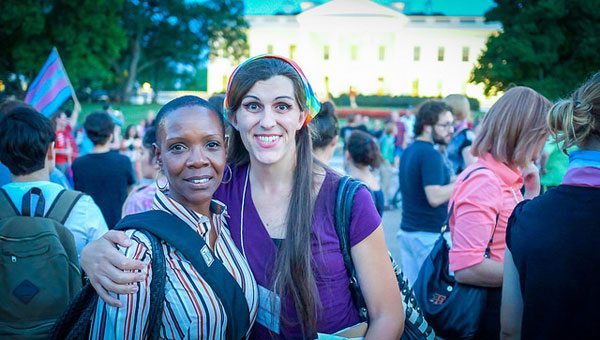
November 8, 2017; CNN
If yesterday’s election was an indicator of our way forward, it definitely held some promise—and not in simply partisan terms. Earlier this week, we wrote about “a wave of underrepresented people” running for office this year. The results are in, and in many victory speeches, a diverse set of winners committed themselves to fighting bigotry and the politics of exclusion. It was a momentous day that we cannot help but hope will be repeated many times over.
There was a Democratic sweep of state and local offices in Virginia yesterday, including in the closely watched race for governor, where Ralph Shearer Northam beat Republican Ed Gillespie. Northam, who was supported not only by Democrats but by moderate Republicans, declared, “Virginia has told us to end the divisiveness, that we will not condone hatred and bigotry, and to end the politics that have torn this country apart.”
There were other noteworthy elections in Virginia: Kathy Tran is the first Asian American woman to be elected to the Virginia House of Delegates; Elizabeth Guzman and Hala Ayala defeated Republican incumbents to become the first two Latinas elected to the Virginia House of Delegates; and Danica Roem, who is openly transgender, won a seat against Bob Marshall, the Republican who introduced the state’s “bathroom bill.”
“Discrimination is a disqualifier,” a jubilant Roem said Tuesday night as her margin of victory became clear. “This is about the people of the 13th District disregarding fear tactics, disregarding phobias . . .where we celebrate you because of who you are, not despite it.”
Roem was not the only trans candidate to win in races across the country. In Minneapolis, transgender activist Andrea Jenkins was elected to the city council. The Star Tribune endorsed her for her long experience working as a policy aide to city council members along with her attentiveness to underrepresented communities. In Erie, Pennsylvania, Tyler Titus won a seat on the school board, becoming the first openly transgender person ever elected in the state.
Sign up for our free newsletters
Subscribe to NPQ's newsletters to have our top stories delivered directly to your inbox.
By signing up, you agree to our privacy policy and terms of use, and to receive messages from NPQ and our partners.
Justin Fairfax is Virginia’s new lieutenant governor elect and only the second Black candidate to win statewide in Virginia. “This election showed that Virginians believe in our unified vision for the Commonwealth, not one based on fearmongering and division,” Fairfax said. “That positive vision is the one we’ll go to Richmond with—and the one that we’re going to spend the next four years making.”
Across the South, this picture was repeated. Brendon Barber was elected as Georgetown, South Carolina’s first-ever African American mayor; Mary Parham Copelan will become Midgeville, Georgia’s first black woman mayor; and at the age of 27, Booker Gainor become Cairo, Georgia’s first Black mayor. Jonathan McCollar, the first Black mayor of Statesboro, Georgia, attributes his win to the “movement” that supported him.
Going further north, New Jersey elected Sheila Oliver as its first Black women lieutenant governor. In Manchester, New Hampshire, Joyce Craig was elected as the first woman mayor in the city’s 266-year history, unseating the Republican incumbent, Ted Gatsas. And, in New Jersey,
Hoboken…elected Ravinder Bhalla as its mayor Tuesday night, which will make Bhalla the first Sikh American to be elected mayor of the city. Last week, Bhalla was the target of racist flyers that showed a picture of him along with the words “Don’t let terrorism take over our town!” plastered above him.
Heading west, Wilmot Collins, a refugee from Nigeria, will become the first Black mayor in Montana’s history, while Jenny Durkan will be Seattle’s first lesbian mayor and its first woman mayor in almost a century. Janet Diaz will become the first Latina member of Lancaster, Pennsylvania’s city council, declaring, that “We need a government that looks like the people it serves…that looks like its constituents.”—Ruth McCambridge












